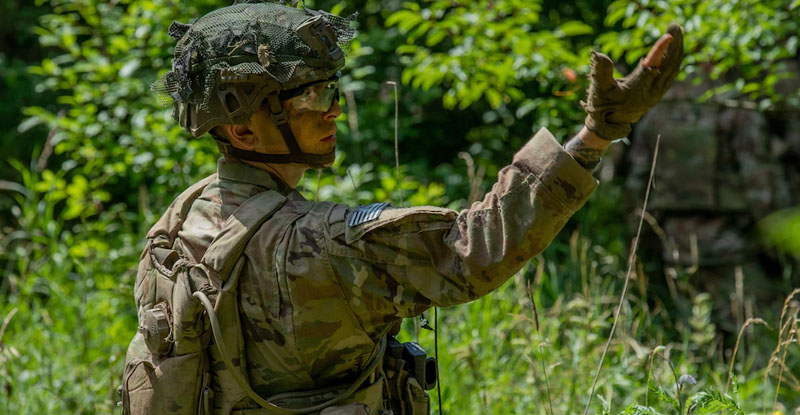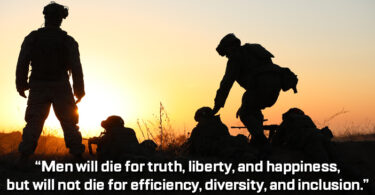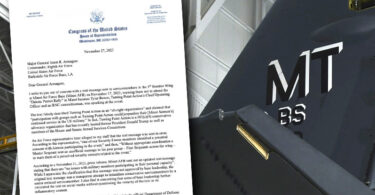By Kyle Schulz, Army veteran
. . . . . As a former Army noncommissioned officer (NCO), I made the decision not to re-up my service contract and have fully transitioned into civilian life.
Why? Because the Army no longer feels like the institution I believed it to be when I enlisted.
I used to always think of the Army as an institution that only bled red, white, and blue.
An institution that was ready to annihilate the enemy at a moment’s notice.
An institution that represented some of the best aspects of America.
Every second the Army spends on DEI training is a second that could have been spent bettering combat readiness.
Every time the Army lowers the physical-fitness standards, it gives soldiers a reason not to better themselves and “be all they can be.” If there is one place the bar should not be lowered, it is our nation’s defense.
Perhaps if the military was more selective, more people would want to join. Instead, it is an institution leaking emails to Mali and intelligence documents on Discord and 4chan.
The military needs to put an emphasis on recruiting this country’s best, because right now, our military is not showing the world our nation’s best.
Despite my recent departure from military service, my close interactions with new recruits and fresh perspective have led me to identify potential solutions to the problems that are hurting military recruitment.
And though the Army, and the military as a whole, are not what I once held them to be, I present these because I still care deeply for our armed forces, and because it is of utmost importance that this country has the best possible warfighting apparatus.
We can start by prioritizing the legitimate grievances of military families. To enhance the appeal of military service, we must address the deep-rooted deterrents that dissuade potential recruits. Corrective steps include raising the pay of lower ranks, improving housing standards, and actively combatting mental-health issues.
By creating better service conditions, we can offer recruits more than just a job — we can provide them with a fulfilling and esteemed career. Allocating the military budget towards these improvements would be more effective and appealing than the current divisive advertising campaigns.
Instead of recruitment ads featuring LGBTQ pride marches, the military should focus on the Army marching on the greatest evils the world has ever known.
It is also crucial to debunk the notion that the military is a mere substitute for higher education. The military offers abundant opportunities for academic and skills development that are often overlooked in recruitment. Emphasizing these avenues for personal growth will help draw a wider range of recruits.
Another area to address is how the surge of social-media and influencer culture has dealt a blow to recruitment efforts. The lack of military endorsements from influential figures is concerning. Platforms such as China-owned TikTok, moreover, are likely even hindering American military advocacy.
The military should invest in targeted ads on platforms like Instagram that do not divisively single out small portions of the population but that represent something everyone in this country shares in: the greatness of America and what those in the military can do to preserve this greatness.
Patriotism is at a low right now, which is all the more reason to feature ads about this nation’s triumphs.
In the news, we constantly see elderly and overweight individuals in a military uniform; this is the representation that the masses see. Perhaps having younger- and healthier-appearing soldiers that look like someone you would trust in a fox hole with you in a combat zone and would be a better choice to represent our military when the nation tunes in to their television.
The military recruiting problem won’t go away by simply pulling these DEI recruiting videos.
The effect goes deeper than just the news cycle. The military is no longer the apex of masculinity, which took years & countless lives lost to build.
Really bad times ahead. https://t.co/EVbhDsanb6
— BowTiedRanger (@BowTiedRanger) July 18, 2023
This is not the same army I served in.
The world is laughing at us. pic.twitter.com/bA2yNh0Utg
— Graham Allen (@GrahamAllen_1) July 1, 2023
The military itself must be responsible for how it appears to outsiders and recruits. So it must uphold its legacy, which remains one of the strongest recruiting draws.
To do this successfully will require an admission: The current recruitment strategy’s ideological shifts have missed the mark.
While progressive campaigns targeting niche demographics may be well intentioned, they fail to resonate with the majority of potential recruits. Historically, enlistment has stemmed from Middle America, the heartland, and the South — regions where tradition, honor, and patriotic duty hold significant value.
To such people, military service goes beyond employment. It is a pledge to protect the nation.
Today, I see soldiers who feel embarrassed and even ashamed when people thank them for their service. This is because they have no idea what their service means to this country or even how great the institution they are a part of can be.
Soldiers get a brief introduction to how the Army was formed and are taught to remember the Army’s birthday in basic-combat training. When you get sent to a unit, you also get a brief history on that unit’s triumphs.
But the Army as a whole has done so much more and can continue to do more.
The Army used to sing cadences about destroying Commies, yet now that is not considered socially acceptable in an institution designed to destroy threats to America.
This is a change for the worse.
The older generations who thank soldiers for their service remember what the military used to be. They see in these young recruits their father who stormed the beaches of Normandy, their brother who gave everything in Vietnam, and even their son or daughter who fought freedom-hating terrorists.
Instead of portraying the military as a bastion of ideological progressivism for recruitment, we should reignite interest by emphasizing its historical achievements and the valor of service members. This approach will invigorate passion for military service among the people who have traditionally embraced it and will appeal to far more people than the current recruiting campaigns.
This does not mean military culture must regress. Rather, it must refocus on the primary objective: securing victory and defending our nation.
The military should not be seen as just another government job or a safe ideological space but as a unified force with a shared mission.
An institution that has consistently shone light during the world’s darkest hours, for those scared in the dark.
Its focal points should be unity and preparedness, not progressive agendas that risk overshadowing our fundamental objective and inadvertently isolating niche groups.
Military DEI initiatives seek to transplant the logic of identity politics, which would raise some favored groups and lower others, into the military space.
Nothing could be worse for the unifying ethic that holds our armed forces together.
In the words of Gunnery Sergeant Hartman from Full Metal Jacket, “Here you are all equally worthless.” Those serving our nation are obviously not worthless. But the relevant essence of Hartman’s remark is that being a part of this institution makes you equal to the person you stand in formation with.
Special sensitivity trainings for various demographics create more problems than they fix.
Yet the Army is constantly creating memoranda and sessions on what to do with, say, soldiers who have gender dysphoria. These trainings are usually a death by PowerPoint, ending with a YouTube video that will likely have sound issues.
And they’re unnecessary: If the military feels that soldiers with gender dysphoria are fit to enlist, that means those soldiers should be treated no differently from anyone else serving.
Having over a million troops devote even an hour of precious time to such trainings is essentially wasting over a million hours’ worth of battle-readiness training.
During my service, I saw more DEI posters than posters or pamphlets devoted to battle readiness. This must change.
Revitalizing the military’s image will not be easy. But the payoff will be worth it.
We can help ensure that the U.S. military remains a formidable, resilient, and diverse force that reflects the strength of our nation.
By reshaping the narrative surrounding military service, honoring its legacy, and targeting our outreach towards everyone, not just niche groups, and by not alienating the people who have traditionally formed the military’s backbone, we can revive recruitment efforts.
And we can prepare a future where our defense force represents unity rather than a battleground for ideological disputes.








Leave a Comment